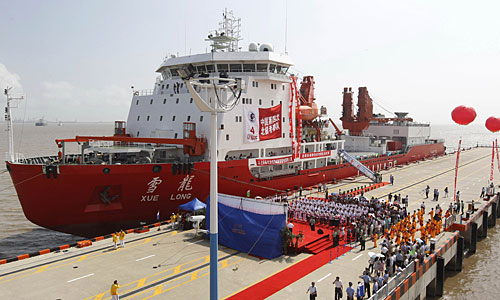|
 |
|
SAFE RETURN: China's icebreaker Snow Dragon carrying the fourth Chinese Arctic scientific expedition team returns to Shanghai on September 20 after completing its 82-day trip to the North Pole (PEI XIN) |
Inflation Worries
Most Chinese say property prices are "too high to accept" despite government measures to cool the sector, says a central bank survey made public on September 19.
Among Chinese households, 72.2 percent thought property prices are too expensive, up 7 percentage points from one year earlier, according to a survey across 50 cities in the third quarter. The survey was posted on the People's Bank of China website.
Property prices in 70 major Chinese cities rose 9.3 percent in August year on year, the National Bureau of Statistics said.
The study also indicated 15.6 percent of respondents want to buy homes during the next three months, down 1.5 percentage points compared with the same period last year.
Further, 58.3 percent of respondents said commodity prices are "too high," a drop of 0.6 percentage points from the second quarter. The study showed 73.2 percent expected prices to continue to increase, up 2.9 percentage points from the second quarter.
Negligence Punished
Ten more officials in north China's Shanxi Province have been punished for visiting bathhouses, karaoke bars and other places of entertainment during work hours.
Seven were found singing karaoke or taking a bath in clubs during work hours while three others were caught gambling in a hotel on September 17. The three officials involved in gambling have been removed from their positions, Shanxi's provincial discipline inspection commission said on September 19.
The move came after the local authorities launched a crackdown campaign late in August, which punished 296 officials for visiting entertainment venues during work hours. Many of them had been fired or given administrative or disciplinary penalties.
Trafficking Victims
Chinese police freed 10,621 women and 5,896 children who had been abducted by human traffickers as of September 6, since the Ministry of Public Security launched a crackdown on trafficking in April last year.
In the campaign, police nationwide apprehended 2,398 human trafficking gangs and handled 13,500 such cases, said the ministry on September 19.
Further, the police put 15,673 suspects in criminal detention and handed out administrative penalties to 1,518 people.
In addition to the tough crackdown, the police have stepped up measures to return the children who have been trafficked to their biological parents, including building a database that collects the DNA of those children who may have fallen victims to human trafficking and their parents.
The database has helped 813 children to find their biological parents through DNA matching.
Inventors Remembered
The International Astronomic Union (IAU) has named three impact craters on the moon after Chinese scientists Cai Lun (63-121), Bi Sheng (990-1051) and Zhang Yuzhe (1902-86), the State Administration of Science, Technology and Industry for National Defense announced on September 20. Cai was credited with the invention of paper, Bi with the invention of movable type and Zhang was an astronomer.
The announcement came more than a month after the IAU approved China's application for the naming on August 2 this year.
With these namings, a total of 14 geological features on the moon has been named after Chinese. The IAU has approved the namings of 1,993 geological entities on the moon since it was founded in 1935.
Liu Xiaoqun, an engineer with China's moon mission project, said the IAU naming is partly a reflection of a country's moon exploration capability and its scientific strength. | 